Preface: Before reading this piece, you might want to read Cow Lawyer.
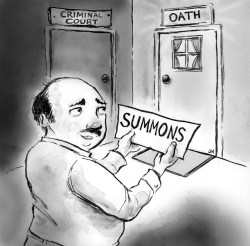 Kenneth McCoy’s estate planning wasn’t finished yet, and; the Hepworth/pasture lease litigation was far from over, when McCoy had received something else he wanted to discuss — a summons in another case. This was a criminal matter. He was being summoned to appear in court for an arraignment and preliminary hearing on aggravated assault charges. This required a whole new level of legal representation.
Kenneth McCoy’s estate planning wasn’t finished yet, and; the Hepworth/pasture lease litigation was far from over, when McCoy had received something else he wanted to discuss — a summons in another case. This was a criminal matter. He was being summoned to appear in court for an arraignment and preliminary hearing on aggravated assault charges. This required a whole new level of legal representation.
This wasn’t my first assault case, but this one was a felony. Aggravated assault. Assault with a deadly weapon. This one involved gun play.
Amazingly enough, the altercation wasn’t over water, roads or access rights, the most common grounds for disputes between farmers, ranchers and other property owners in Kane County, and probably throughout the West. This dispute arose from perhaps the next most common ground for contention between neighboring landowners: fences, and McCoy’s recently acquired pet peeve — cattle — in this case, trespassing cattle.
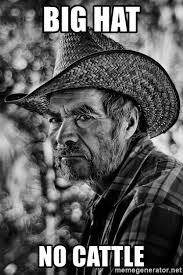 By then, although Hepworth’s temporary “stocker” cows were long gone, as far as McCoy was concerned, despite his pompous claim to the title of rancher, in reality he hoped to avoid having another cow ever set foot on his property again. He would have been perfectly content to just let the deer have all the feed, but unfortunately, he had to do some farming in order to continue to qualify for landowner mule deer tags in the renowned Paunsaugunt Limited Entry Wildlife Management Unit (which was considered a trophy hunting unit, and the landowner tags were marketable for unbelievably large sums of money). Qualification for the tags, which were intended as reimbursement for crop damage, was one of the primary reasons McCoy bought the ranch in the first place, but qualification was based on the number of acres “mechanically harvested” on an annual basis, and therefore required a certain amount of farming (and eventually led to McCoy high-centering his big Belarus tractor on a windrow of Russian Thistle — tumbleweeds — he was attempting to bale, in the process of mechanically harvesting), to maintain his acreage qualification.
By then, although Hepworth’s temporary “stocker” cows were long gone, as far as McCoy was concerned, despite his pompous claim to the title of rancher, in reality he hoped to avoid having another cow ever set foot on his property again. He would have been perfectly content to just let the deer have all the feed, but unfortunately, he had to do some farming in order to continue to qualify for landowner mule deer tags in the renowned Paunsaugunt Limited Entry Wildlife Management Unit (which was considered a trophy hunting unit, and the landowner tags were marketable for unbelievably large sums of money). Qualification for the tags, which were intended as reimbursement for crop damage, was one of the primary reasons McCoy bought the ranch in the first place, but qualification was based on the number of acres “mechanically harvested” on an annual basis, and therefore required a certain amount of farming (and eventually led to McCoy high-centering his big Belarus tractor on a windrow of Russian Thistle — tumbleweeds — he was attempting to bale, in the process of mechanically harvesting), to maintain his acreage qualification.
Kenneth McCoy and Hektor “Hek” MacDonald were neighboring ranchers of sorts in the Canyon. Johnson Canyon is a picturesque canyon about 10 miles east of Kanab, named after Nephi Johnson, one of its original settlers. Although the canyon itself winds down fairly quickly from the Skutempah Plateau, it opens into a broad canyon floor, which runs for well over ten miles. The canyon floor is divided by a seasonal stream, as well as a paved county road that runs right up the middle, with irrigated farm ground on both sides, surrounded in many places by beautiful coral and vermillion colored sandstone cliffs, bluffs and buttes, with numerous rock outcroppings and picturesque side canyons running to the east and west.
Over the years, like many places in Utah and throughout the West, there had been some bitter disputes in Johnson Canyon over increasing demands on a decreasing water supply, leading to long-standing feuds in the Canyon.
As it turned out, McCoy’s main bone of contention with Hek MacDonald didn’t have as much to do with his trespassing cattle as it did with Hek’s long-standing feud with Sysco Jackson, another neighboring rancher, with whom McCoy sided, over water.
Although one would have never known just to look at him, or even by casual acquaintance, Hek MacDonald was a retired military man. To say that he wasn’t a typical, let alone stereo-typical rancher, would also be an understatement. Hek and his wife had a small ranch about half-way up the Canyon. They didn’t have any children. Some people probably considered them to be a little bit eccentric, but they were basically good people and ran a nice little herd of white, Charolais cattle. Their place had more water than most, with some good-sized ponds and sub-irrigated meadows. The main distinguishing feature of their place at that time, however, was the condition of its fences.
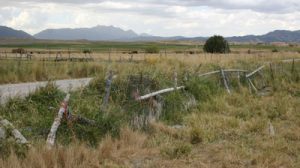
Although Hek MacDonald did eventually overhaul some of his fences, if there were any good fences on the place at that time, they weren’t the boundary fences between him and his neighbors. Most of them were made of ancient cedar posts, some of which were burned, broken or rotted off at ground level, and rusty barbed wire, with several strands broken or drooping to the ground. They weren’t much of a barrier to Charolais cattle.
If good fences make good neighbors, MacDonalds had to rely entirely on other qualities and characteristics to make them good neighbors. Although most neighbors didn’t seem to have much of an ax to grind with them, it wasn’t because of their fences.
For quite a stretch up the Canyon, MacDonalds’ place runs along the county road, so they don’t share that stretch of fence with any neighbors, per se. Consequently, that seemed to be the stretch of fence that was always in the worst shape, and in most need of repair. In all fairness to Hek, the hordes of deer that hang in the canyon during the late fall and winter time, crossing back and forth to the creek to water, are real hard on fences. Consequently, between deer damage, lack of maintenance, and the grass always being greener on the other side of the fence, it seemed like Hek’s big white cattle were always out in the roadway; perpetually grazing the roadsides.
From what I have since been able to gather, Hek MacDonald was actually a good enough guy, and most people were so used to seeing both his cattle and deer on the road, that it didn’t really bother them much. Most of his neighbors just tried to beef up their own fences enough so that Hek’s cattle couldn’t get in from the roadway. Despite the bad blood between Hek and Sysco Jackson, even when MacDonalds’ cattle were out, Sysco’s fences were good enough, that the cattle didn’t often find a way into his place.
But Kenneth McCoy’s fences weren’t quite as cow-tight as Sysco’s. McCoy also hated to be inconvenienced by having to get out of his truck to open and close a gate to the county road, and he was too cheap to install a cattle guard. So his fields were a prime target for Hek’s free roaming Charolais cattle. As far as McCoy was concerned, ranchers who actually had cattle ought to be fully responsible to keep their cattle in; he shouldn’t have to keep them out. So on the occasion in question, when the feed got a little thin along the roadway, apparently during the night, Hek’s cattle moved up the road, through the open gate, and into McCoy’s place.
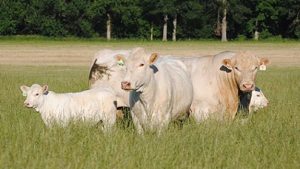
That morning, when Kenneth McCoy got up and about and discovered Hek MacDonald’s white cattle in his field, he was instantly “on the fight.” Cows were already a nasty word in his vocabulary, but more importantly, given the state of Hek’s water dispute with Sysco Jackson, McCoy was just spoiling for a good reason to jump on the band wagon and mix it up with Hek MacDonald. At that point, particularly given their respective last names, a Scottish lawsuit (physical altercation) seemed virtually inevitable.
Consequently, not more than a few minutes later, after hurriedly pulling on pants and boots, McCoy was getting more upset by the minute in his frustrated attempts to get the cows to do anything he wanted, as he trudged around behind them hollering and making menacing gestures with a big stick and a pistol he was packing for protection, as they stood with their heads buried up to their ears in alfalfa.
From here, the parties’ respective versions at the preliminary hearing probably ought to tell the rest of the story.
As the prosecutions’ first witness, Hek MacDonald was on the witness stand. It was the regularly scheduled Sixth Judicial District Court Law & Motion Calendar in Kane County, and the courtroom was crowded. District Court Judge Tom Watson was sitting solemnly, in a big black robe, on the elevated bench. Court clerk, Nancy Johnson, was seated in front, taking copious minutes. Kane County Jailer/Bailiff Cowhide Robinson was standing at the bailiff’s table along with County Sheriff Jack Mackelprang, both in crisp brown uniforms. County Attorney, Tim Stankey, was slouching at the prosecution table, in a wrinkled, loud plaid polyester sport coat and wide, bold striped tie that abruptly ended about halfway down his stomach. And Kenneth McCoy and I were there on pins and needles, seated at the defense table.
The charge was aggravated assault with a deadly weapon. This was serious. If Judge Watson found probable cause for the charges, McCoy would be bound over for trial. If he was convicted, he could do time.
Hek MacDonald appeared to be sixty something; a good-sized man. He had kind of a “rounded” look. One 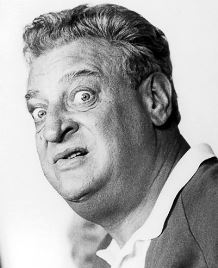 would have to assume the roundedness had resulted since his retirement from the military, and maybe had something to do with the habit he admitted to on the witness stand of regularly imbibing liquid spirits, often starting first thing in the morning. His shortish hair was gray, almost white, and unkempt, smashed down close to his head in some places, and sticking straight out in others. He looked like he’d just rolled out of bed that morning, pulled on his pants, and headed straight for the courthouse. His eyes had kind of a bugged-out, Rodney Dangerfield look, like his eyelids never closed. He was Stan McCormick’s uncle to boot (although this line of the McCormick Clan was never known for much family unity and togetherness). Although Hek seemed to defy most generalized physical descriptions, if anything, he had a perpetual look like he’d just stuck his finger in a light socket. He hardly looked like a military man, but he didn’t exactly look like a typical rancher either. Although I had certainly heard a little bit about him, and read the statement he had given to the sheriff, I’d never met, nor even seen him before.
would have to assume the roundedness had resulted since his retirement from the military, and maybe had something to do with the habit he admitted to on the witness stand of regularly imbibing liquid spirits, often starting first thing in the morning. His shortish hair was gray, almost white, and unkempt, smashed down close to his head in some places, and sticking straight out in others. He looked like he’d just rolled out of bed that morning, pulled on his pants, and headed straight for the courthouse. His eyes had kind of a bugged-out, Rodney Dangerfield look, like his eyelids never closed. He was Stan McCormick’s uncle to boot (although this line of the McCormick Clan was never known for much family unity and togetherness). Although Hek seemed to defy most generalized physical descriptions, if anything, he had a perpetual look like he’d just stuck his finger in a light socket. He hardly looked like a military man, but he didn’t exactly look like a typical rancher either. Although I had certainly heard a little bit about him, and read the statement he had given to the sheriff, I’d never met, nor even seen him before.
Stankey started off with his direct examination: “please state your full name, Mr. MacDonald.”
“Hektor T. MacDonald, but most people call me ‘Hek’.”
“Where do you live and what do you do for a living, Hek?”
“I’m retired from the military and I have a ranch in Johnson Canyon.”
“Alright Hek, do you recall what happened on June 18, 1992?
“Yeah, I don’t know how I could forget that very easily.”
“Alright, can you tell the Court what happened on that date?”
“Well, it was probably between about seven and eight in the morning. I was just leaving my house to go check on my cows when Mitch Owens, who’s one of my neighbors and married to my niece, came by and said he’d been up the canyon, and it looked like I had some cows over in Kenneth McCoy’s place.”
“What did you do?”
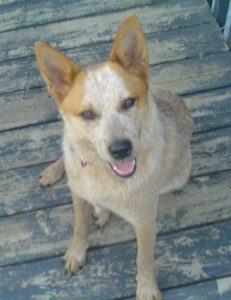 “Well, I thought maybe I’d better go get ‘em out, so I thanked Mitch, and jumped in my little pickup and started up the canyon. When I got to McCoy’s I could see that he’d beat me to the punch and was trying to move the cows out by himself, but they weren’t being very cooperative. He hollered something at me, and I could tell he was real mad. I didn’t really want to mix it up with him, so I just turned around and headed back down to my place to get Red, my little red heeler cattle dog, that I had forgotten in my hurry the first time, so that I could make it as easy as possible to get the cows out.”
“Well, I thought maybe I’d better go get ‘em out, so I thanked Mitch, and jumped in my little pickup and started up the canyon. When I got to McCoy’s I could see that he’d beat me to the punch and was trying to move the cows out by himself, but they weren’t being very cooperative. He hollered something at me, and I could tell he was real mad. I didn’t really want to mix it up with him, so I just turned around and headed back down to my place to get Red, my little red heeler cattle dog, that I had forgotten in my hurry the first time, so that I could make it as easy as possible to get the cows out.”
“What happened then?”
“When I got back, I could see that McCoy hadn’t made much progress, so I parked along side the road, got out, climbed the fence, and told Red to get around ‘em.”
“How far were you from McCoy at that point?”
“Oh, I was probably within a couple hundred feet. My cows really weren’t that far out into his field, and he was right there; he had a big stick in one hand that he was waving around, trying to get them going, but I couldn’t tell exactly where to.”
“What happened then?”
“They were pretty much trying to ignore him. My cows are pretty docile. They usually don’t get too excited. So they’d just move a few steps, then put their heads down and start eating again.”
“Did he say anything to you.”
“Yeah. He was saying something to me. He was yelling something at me the minute I pulled up, but I couldn’t make out most of what he was saying. I could just tell he was real mad. That’s why I’d gone back for the dog.”
“Could you make out any of what he was saying?”
“Oh, I could only catch about every other word or so, but he was screaming something about, now you’ll have to excuse the French, if you want me to repeat exactly what he said, because he was really cursing. He was saying something about my ‘god damned fences,’ and ‘my god damn cows’ and ‘if they didn’t start moving, he was going to start shooting.’ But I didn’t see a gun in his hand right at first. I only saw the big stick.”
“Did he say anything else that you could make out?”
“He was carrying-on something about ‘stray-penning’ my cows. He said they were in trespass, and he was going to stray-pen them. Then he started screaming for me to ‘get my dog and get the hell off his land, because he was going to stray-pen the cattle.”
“Did you feel threatened?”
“Well, right at first I didn’t. I was actually more concerned that my cows might bloat on his alfalfa. . . . But by then, he had kind of quit harassing the cows, though, and was headed straight for me. . . . This all took place in a matter of just a few seconds. . . . In the mean time, I kind of had my side and back to him and was trying to give my dog directions. Red had gotten around the cows, and had started moving them toward the gate. 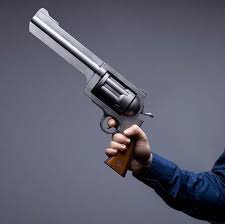 As I started to turn back toward him, I could feel McCoy moving my direction, and as I turned around, I could start to see him out of the corner of my eye. That’s when I noticed the gun. He had a big pistol in his right hand, and it was pointed right at me.”
As I started to turn back toward him, I could feel McCoy moving my direction, and as I turned around, I could start to see him out of the corner of my eye. That’s when I noticed the gun. He had a big pistol in his right hand, and it was pointed right at me.”
“Did he say anything?”
“Boy, it’s hard to remember his exact words and everything he said, but he had that gun pointed right at my head, and he screamed something like ‘if you don’t get the hell out of here, I’m going to blow your head off.’. . . I distinctly remember him saying that he was going to blow my head off. . . . But by that time, my dog had the cows headed out through the gate and onto the road, and McCoy acted like he was real mad because I had gone ahead and gotten the cows out so he couldn’t stray-pen ‘em. He was saying something about me being hard of hearing.”
“What did you say?”
“I didn’t say a damn thing.”
“How far away was he?”
“At that point, he was only 15 or 20 feet away.”
“So he was 15-20 feet away and had the pistol pointed at your head?”
“He sure did.”
“Did you feel threatened?”
“Well, I was in the military — the Marine Corps — for over 20 years, and that was back before, during and after both the Korean and Viet Nam Wars. So it’s not like it was the first time I’d ever looked down the barrel of a gun or anything, but sure, he sounded like he meant business.”
“Did he say anything else?”
“Yeah, he said something like ‘what’s wrong with you? Are you deaf? I ought to drop you right in your tracks. Then I think he said something like ‘I said MOVE, dammit’!”
“Then what happened?”
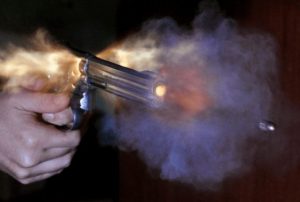 “Then, KABAUWOOOOM! I couldn’t believe it. Shocked the hell out of me. I kept trying to breathe real hard, testing my body parts, looking around for blood, trying to make sure I hadn’t been shot. He fired right at me, and it came close enough that I could feel the percussion, and my ears were ringing. I thought for sure he’d shot me, but I couldn’t find where I’d been hit.”
“Then, KABAUWOOOOM! I couldn’t believe it. Shocked the hell out of me. I kept trying to breathe real hard, testing my body parts, looking around for blood, trying to make sure I hadn’t been shot. He fired right at me, and it came close enough that I could feel the percussion, and my ears were ringing. I thought for sure he’d shot me, but I couldn’t find where I’d been hit.”
“I have no further questions,” Stankey announced, yielding the floor to me for cross examination, which didn’t seem to do much to undermine Hek MacDonald’s story.
You may also like
-
Fed’s War on the Hages: The Ultimate Land Clearance
-
Between Fences and Firearms, Part 2 — Range Wars & Legal Tales — by Mancos MacLeod
-
Kangaroo Court — Range Wars and Legal Tales — by Mancos MacLeod
-
Cow Lawyer — Range Wars & Legal Tales — by Mancos MacLeod
-
Real People for Clients — Range Wars & Legal Tales — by Mancos MacLeod

